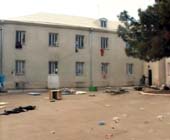Prisoners riot over amnesty
By Ernest Petrosyan
Tuesday, April 21

Minister for Probation and the Penitentiary System Dimitri Shashkin told journalists outside the prison late on April 18 that the inmates’ demand was “unrealistic” as it would have been impossible to pardon all of them, because dozens had been convicted for grave crimes. Echoing Shashkin’s remarks, Sozar Subari, the Georgian Public Defender, who was also monitoring the situation inside the prison, agreed with Shashkin that the demand to pardon all 700 inmates was “unrealistic and impossible to fulfill.” However he said that the cases of some inmates convicted of petty crimes and those whose convictions were questionable could have been reviewed for pardoning in the future.
The Head of the NGO Former Political Prisoner for Human Rights Nana Kakabadze stated that the riot was related to the President’s amnesty. “They were protesting against illegal arrests and the unbearable conditions in the number 5 women’s prison. They had great hope that the President would release them,” stated Kakabadze. Talking to the Messenger she also proved that all 742 transferred inmates have gone on a hunger strike until they are released.
Both Parliamentary and non-Parliamentary opposition members gathered in front of the women’s prison but were prevented from entering it. Peter Semneby, the EU Representative in the South Caucasus, was also not allowed to enter the prison. “Instead of dealing with his institutions Shashkin was busy holding dialogue with some of the opposition. It would have been better for him to get on with his business,” stated the leader of the movement “For United Georgia” Eka Beselia, who said such riots always have a reason.
Due to significant deterioration of living conditions and heavy damage to the prison’s infrastructure resulting from the riot, Penitentiary officials decided to transfer the inmates from Tbilisi to a jail in Rustavi at dawn on April 19, 12 hours after the disturbances began. Salome Makharadze, a spokesperson for the Probation and Penitentiary Ministry, said that no one had been injured either during the riot or in the process of transferring the inmates. Representatives from the Pubic Defender’s Office, monitoring the transfer of the prisoners, have not as yet reported any cases of the use of excessive force against the inmates.
On April 20 the Minister for Probation and Penitentiary Dimitri Shashkin and Parliamentary opposition members visited inmates who had been transferred to Rustavi jail. Shashkin stated that the Ministry had obtained new items for the inmates and all their private possessions were being transferred to Rustavi jail. “The opposition MPs had an opportunity to visit the inmates, enter their cells if they wished and spoke to them,” stated Shashkin.
“We met the inmates because we wanted to hear what they thought about yesterday’s actions. The majority of the inmates expressed regret, many of them also came under the influence of the initiators of the riot and will make a collective statement to Minister Shashkin about the incident,” stated Levan Vephkhvadze, an opposition Member of Parliament.
“The most important thing is that the riot has been calmed without any violent incident in relation to the inmates, and in my opinion this is a great success for all sides. The investigation will reveal everything and I hope all the inmates will who didn’t take part in the riot will return and be given serious privileges,” stated opposition MP Giorgi Akhvlediani.
Jondi Baghaturia, another opposition MP, stated that was monitoring the prison during the riot and can say for sure there no violence or prison break attempts by the inmates occurred. Baghaturia stated that if a criminal case is begun against the inmates he will give testimony in their support. He added that the inmates were protesting against the unfairness of the process of amnesty, and they have this right.
According to Salome Makharadze only an investigation is being conducted at this stage and no criminal case has been initiated as yet.
